Overview
Managing Type 2 Diabetes can feel overwhelming, but understanding the essential lab tests can empower you on this journey. Key tests include:
- Fasting Plasma Glucose (FPG)
- Hemoglobin A1C
- Oral Glucose Tolerance Test (OGTT)
- Random Plasma Glucose Test (RPGT)
- C-Peptide Test
- Lipid Profile
- Urinary Albumin Test
- Thyroid Function Tests
- Vitamin D levels
These tests collectively help you understand your blood sugar levels, insulin production, cardiovascular risk, kidney health, and overall metabolic function. By having this information, you and your healthcare team can create tailored management strategies that fit your unique needs.
It's understandable to feel uncertain about what these tests mean. Remember, you’re not alone in this journey. We are here to support you every step of the way. If you have questions or need guidance, don’t hesitate to reach out for support or resources that can help you manage your diabetes effectively.
Introduction
As the global prevalence of Type 2 Diabetes continues to rise at an alarming rate, it's understandable to feel concerned about managing this condition. Understanding the critical role of lab tests in your journey has never been more essential. These tests not only provide insights into blood sugar levels but also help in identifying potential complications, guiding treatment strategies, and improving overall health outcomes.
With so many tests available, you might wonder which ones are truly indispensable for effective management. This article delves into nine essential lab tests that can empower you and your healthcare provider alike, shedding light on their significance and the actionable insights they offer for a healthier future.
Remember, you're not alone in this journey; we are here to support you every step of the way.
T2DSolutions: Comprehensive Resource for Type 2 Diabetes Management
At T2DSolutions, we are dedicated to empowering both individuals and healthcare providers with the essential knowledge and resources needed to manage Type 2 Diabetes effectively. Our platform offers a wide array of educational resources aimed at managing blood sugar, including dietary plans, exercise routines, and insights into the latest medical research breakthroughs. Recent studies have shown that self-management education interventions can lead to significant improvements in patient outcomes, including notable reductions in HbA1c levels across various programs. For instance, a systematic review revealed that Diabetes Self-Management Education (DSME) effectively lowered HbA1c by 0.64% in randomized controlled trials and 1.27% in quasi-experimental studies, underscoring the importance of structured education in the care of individuals with diabetes.
We understand that community support is crucial when managing blood sugar conditions. Case studies have illustrated that community-based education programs not only enhance self-care behaviors but also improve the mental health-related quality of life for participants. By fostering connections among individuals facing similar challenges, T2DSolutions cultivates a nurturing environment that encourages resilience and hope.
Our commitment to education and community support is vital for the effective management of this condition and for achieving better health outcomes. As the prevalence of Type 2 Diabetes continues to rise, with projections estimating that 642 million individuals will be affected worldwide by 2040, the need for accessible and reliable educational resources has never been more urgent. At T2DSolutions, we strive to simplify the journey for those impacted, ensuring that they have access to clear, actionable, and reliable information tailored to their unique needs. Remember, you're not alone in this journey; we are here to support you every step of the way.
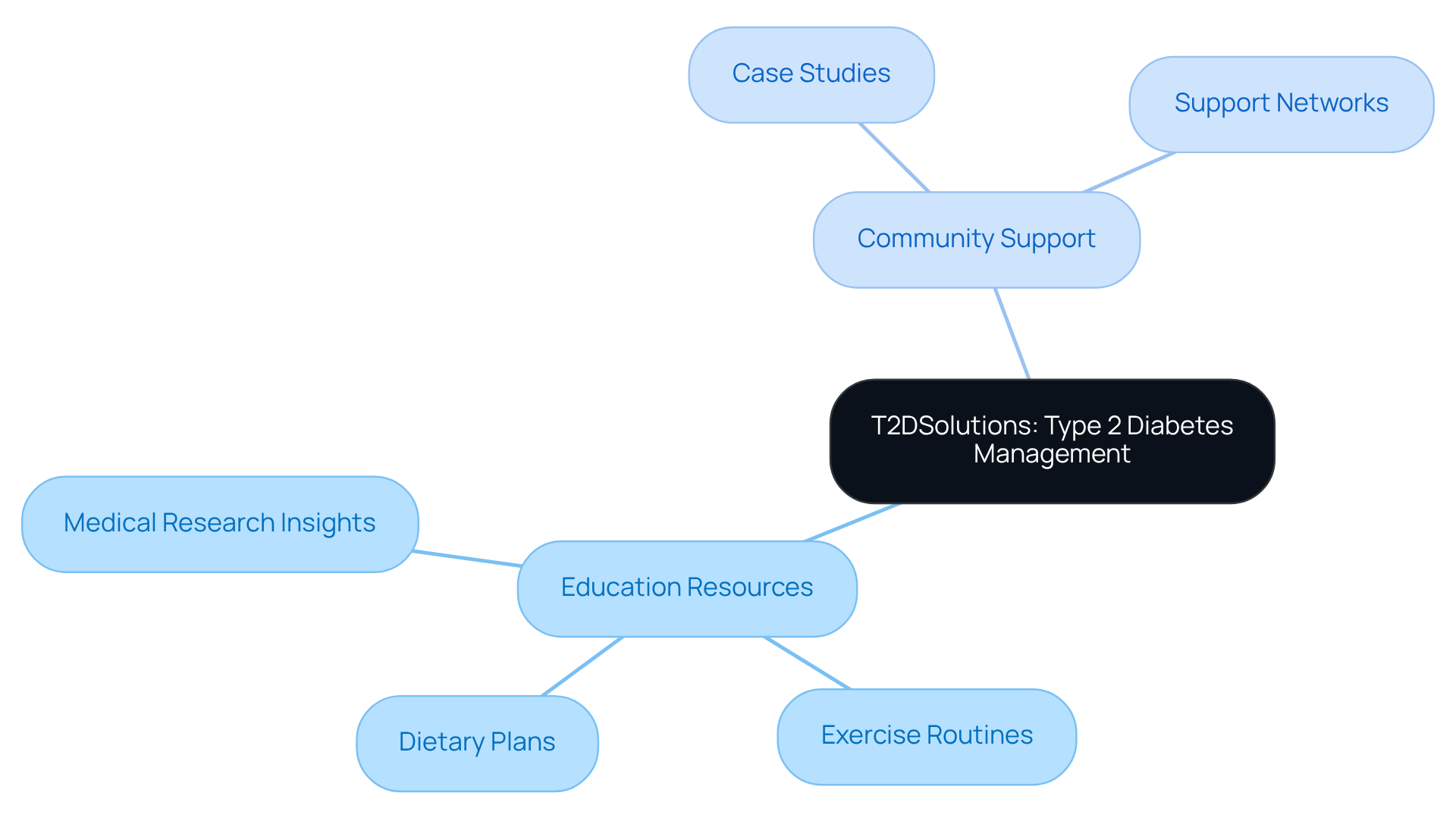
Fasting Plasma Glucose (FPG): Key Diagnostic Test for Diabetes
The Fasting Plasma Glucose (FPG) test is an important tool that helps assess blood sugar levels after fasting for at least 8 hours. According to the latest recommendations, a fasting blood glucose level of 126 mg/dL or higher indicates glucose intolerance, while levels between 100 and 125 mg/dL suggest prediabetes. It's vital to monitor your FPG regularly, as this empowers you to manage your blood sugar levels effectively and make informed lifestyle choices.
As we look toward 2025, it’s concerning to note that around 88 million adults in the United States are living with prediabetes, often without realizing it due to a lack of noticeable symptoms. This highlights the need for regular testing, especially for those who may be at risk. Maintaining fasting blood glucose levels below 100 mg/dL is crucial in preventing the progression to type 2 diabetes, as indicated by type 2 diabetes lab tests.
At T2DSolutions, we are here to support newly diagnosed individuals on their journey toward managing their condition. By understanding and utilizing the FPG test, you can take proactive steps, such as embracing a balanced diet and engaging in regular physical activity. We also provide valuable resources and guidance to help you navigate this journey, ensuring you have the support you need every step of the way.
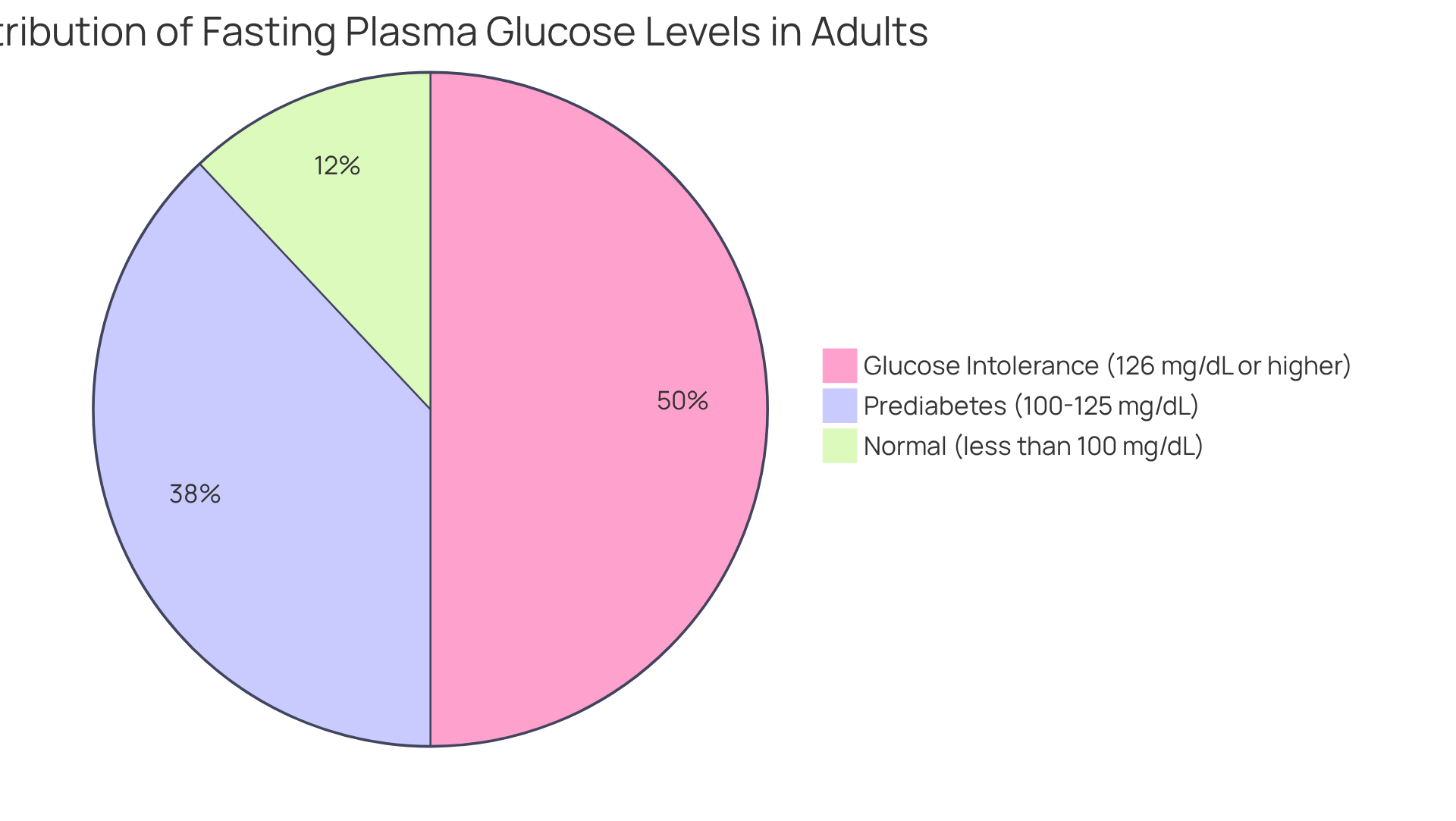
Hemoglobin A1C: Essential for Long-Term Glucose Monitoring
The Hemoglobin A1C test is a valuable tool used in type 2 diabetes lab tests to evaluate the average blood sugar levels over the past 2 to 3 months. This test is crucial for understanding long-term glucose management and is particularly important in type 2 diabetes lab tests for those facing high blood sugar. If your A1C level is 6.5% or above, it suggests that type 2 diabetes lab tests may indicate a diagnosis of diabetes. Levels between 5.7% and 6.4% suggest prediabetes, a condition that can be assessed and managed through type 2 diabetes lab tests.
Regular assessments through type 2 diabetes lab tests, including A1C tests, are important. They help you and your healthcare professional gauge how well your blood sugar control strategies are working. This ongoing evaluation allows for necessary adjustments to be made, ensuring you are supported in your health journey.
At T2DSolutions, we are committed to providing resources that empower you to understand your A1C results and effectively manage your condition. Remember, discussing your A1C results with your healthcare provider is vital. Together, you can create a personalized management plan that suits your needs, allowing you to take proactive steps in your care.
You're not alone in this journey. We are here to support you every step of the way, encouraging you to reach out for help and share your experiences with others who understand what you’re going through.
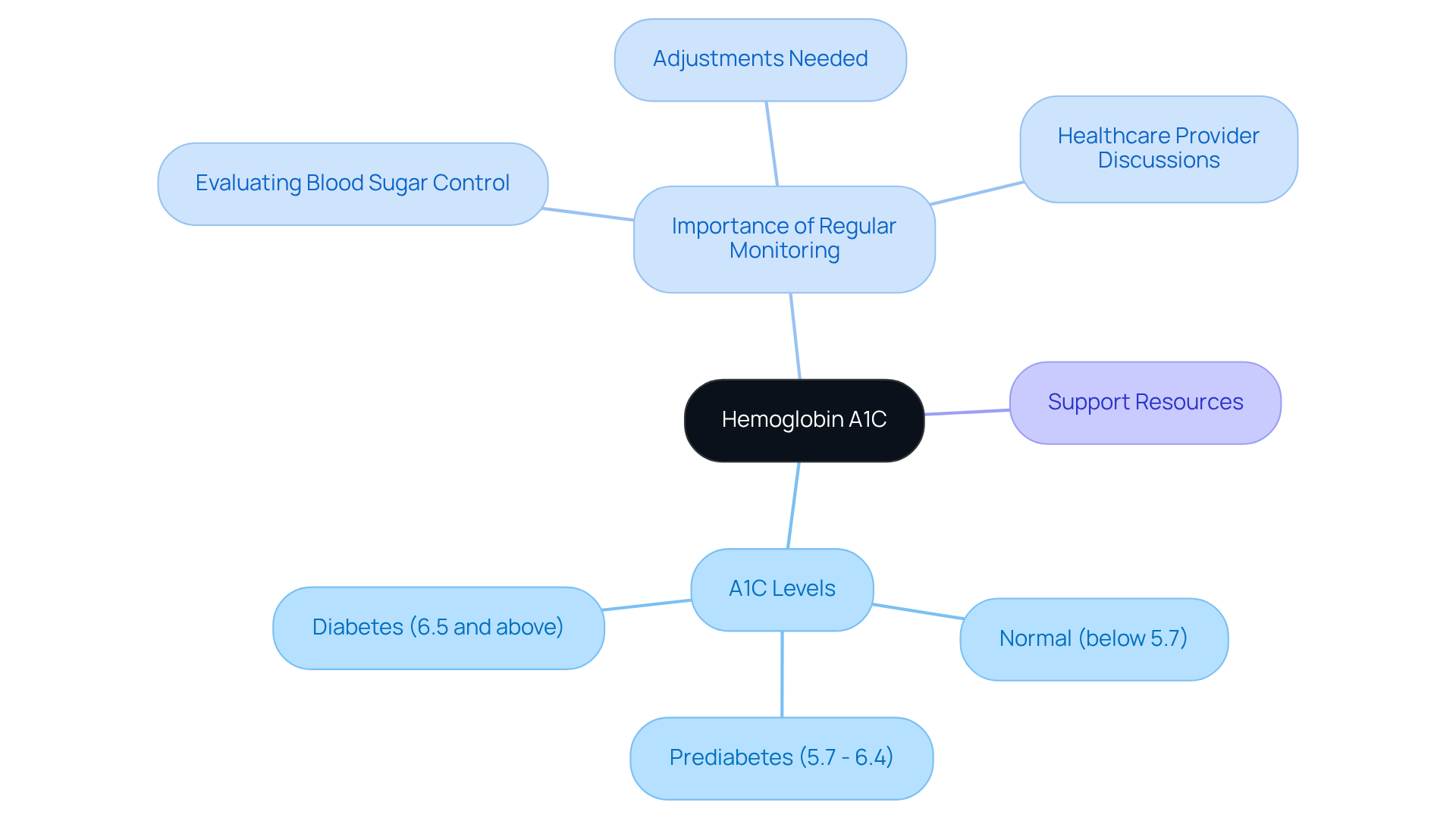
Oral Glucose Tolerance Test (OGTT): Critical for Diagnosis
The Oral Glucose Tolerance Test (OGTT) is an essential diagnostic tool that evaluates how well your body processes sugar. After fasting overnight, you will drink a glucose solution, and your blood sugar levels will be checked at specific intervals. If your 2-hour blood glucose level is 200 mg/dL or higher, it confirms a diagnosis of the condition, while levels between 140 and 199 mg/dL may indicate prediabetes. Recent data highlights a rising prevalence of gestational glucose intolerance, particularly identified through OGTT results, which underscores the test's importance in clinical settings.
At T2DSolutions, we understand the significance of the OGTT in diagnosing gestational glucose intolerance and evaluating insulin resistance, especially for women who have experienced hyperglycemia during pregnancy. Healthcare providers emphasize that the OGTT remains one of the most reliable type 2 diabetes lab tests for assessing glucose metabolism and identifying individuals at risk for developing Type 2 Diabetes. Experts note that the OGTT's ability to capture peak blood sugar levels offers critical insights into your metabolic health.
Looking ahead to 2025, there is a growing consensus among healthcare professionals about the OGTT's effectiveness in diagnosing the condition. The International Diabetes Federation has endorsed a 1-hour OGTT as a practical alternative to the traditional 2-hour test, which enhances early detection and intervention strategies. Current statistics suggest that the 1-hour glucose assessment is a more robust predictor of future dysglycemia, making it a valuable resource for managing your health. This shift demonstrates a commitment to improving diagnostic precision and outcomes for individuals like you.
For further details on the OGTT and other management strategies, we invite you to explore the resources available at T2DSolutions, your supportive hub for Type 2 and Type 3 education. Remember, you're not alone in this journey; we are here to support you every step of the way.
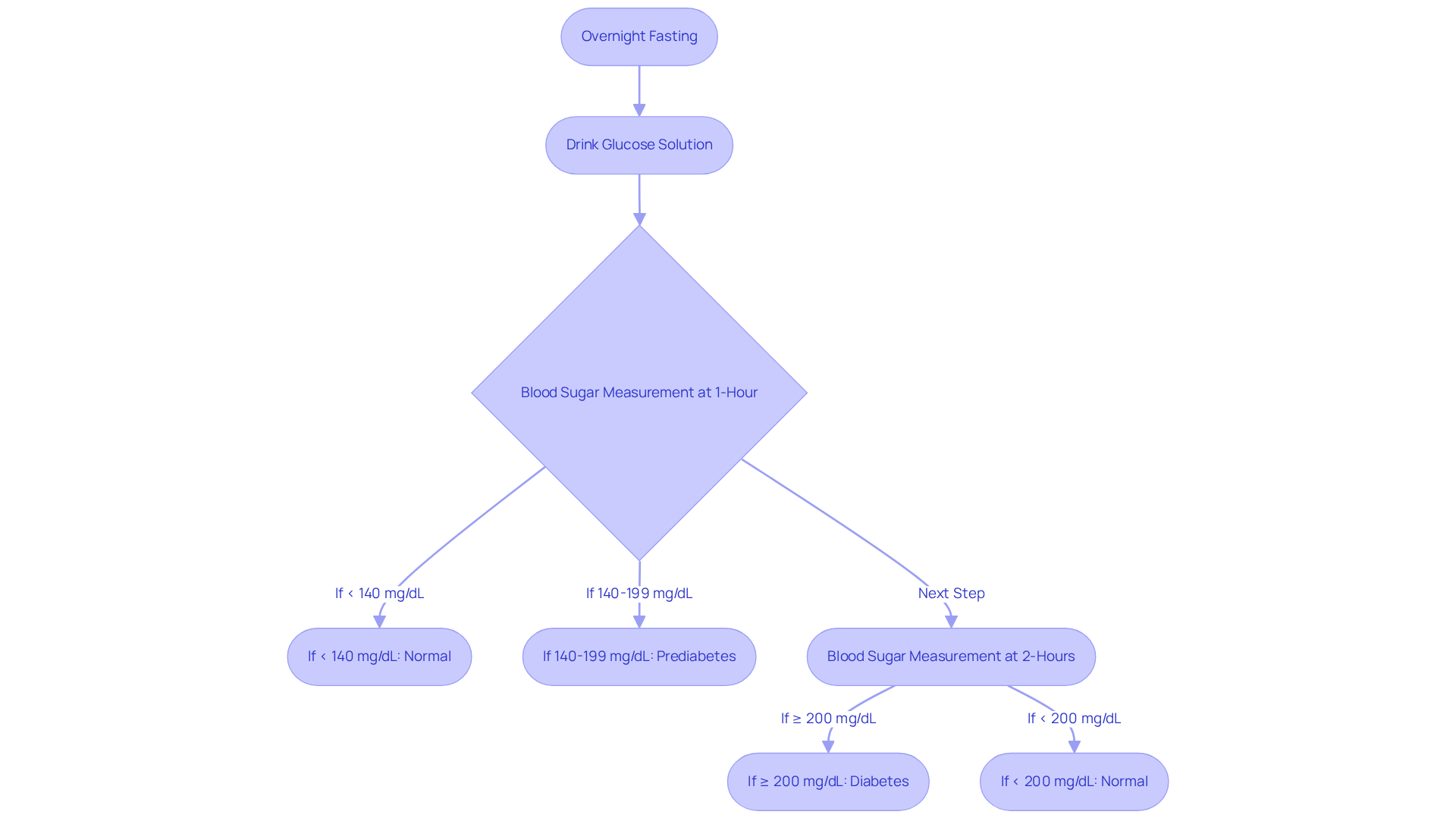
Random Plasma Glucose Test: Quick Diagnostic Approach
The Random Plasma Glucose Test (RPGT) is an essential tool used in type 2 diabetes lab tests to measure blood sugar levels at any time, regardless of when a patient last ate. If the results from type 2 diabetes lab tests show 200 mg/dL or higher, especially when symptoms are present, it can confirm a diagnosis of diabetes. This test is particularly valuable in emergency situations, where quick diagnosis through type 2 diabetes lab tests is vital for timely care. It's understandable to feel anxious about these scenarios, but recent studies show that type 2 diabetes lab tests, including RPGT, are frequently used in emergency departments, especially for diabetes-related conditions.
For instance, consider a real-life case where a patient arrived with severe hyperglycemic symptoms. Thanks to the RPGT, healthcare providers could promptly diagnose the issue and provide immediate treatment, stabilizing the patient's condition. With diabetes projected to affect over 10% of the population in various regions by 2050, the importance of type 2 diabetes lab tests in managing such a growing public health concern cannot be overstated.
Medical professionals emphasize that the RPGT's ability to deliver quick glucose readings is crucial in emergencies, particularly for type 2 diabetes lab tests. This capability enables healthcare teams to make informed decisions swiftly, ensuring that patients receive the care they need. Remember, you're not alone in this journey; we are here to support you every step of the way. If you have concerns about your blood sugar levels, seeking help and resources is a positive step forward.
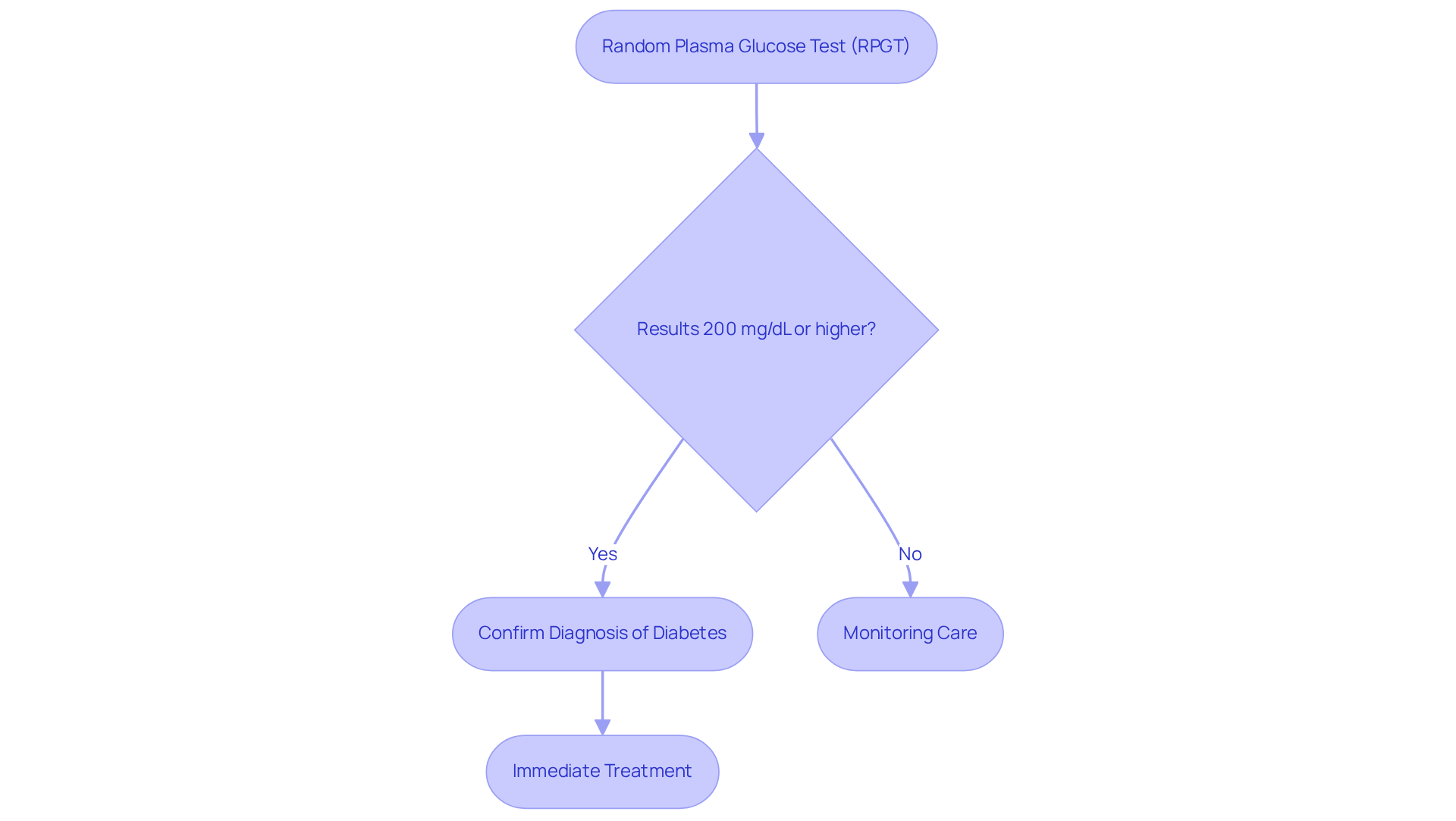
C-Peptide Test: Assessing Insulin Production
The C-Peptide Test is a crucial tool for understanding insulin production, as it measures the concentration of C-peptide in the blood. This test is particularly important in differentiating between Type 1 diabetes and Type 2 diabetes lab tests. Research from 2025 indicates that low C-peptide levels are often found in newly diagnosed individuals with Type 1 diabetes, highlighting the body's struggle to produce enough insulin. Conversely, normal or elevated C-peptide levels are typically observed in Type 2 diabetes lab tests, where insulin production may be adequate but often ineffective due to insulin resistance.
Understanding C-peptide levels from Type 2 diabetes lab tests can significantly influence treatment approaches, and recent studies emphasize this importance. Endocrinologists point out that accurately assessing C-peptide concentrations not only aids in diagnosis but also plays a key role in managing the condition effectively. This is especially vital as the prevalence of low C-peptide levels in newly diagnosed patients continues to be a focal point in the study of metabolic disorders.
The value of the C-Peptide Test extends beyond mere classification; it provides insight into the underlying mechanisms of the condition. By evaluating insulin production through C-peptide levels, healthcare professionals can tailor treatment plans to meet the individual needs of patients. This personalized approach ultimately leads to more effective management of diabetes, ensuring that you feel supported and understood throughout your journey. Remember, you're not alone in this process, and there are resources available to help you navigate your health.
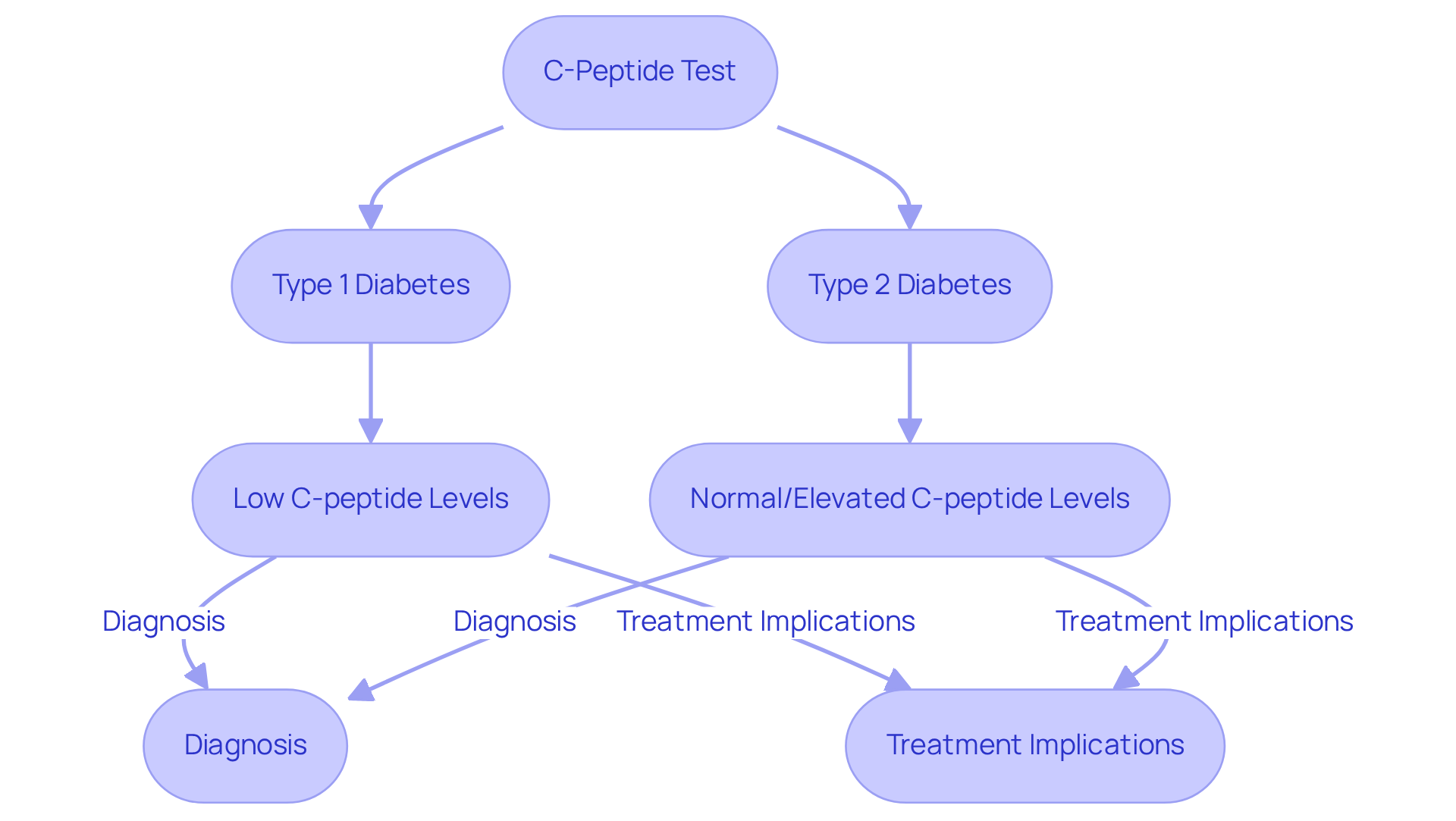
Lipid Profile: Evaluating Cardiovascular Risk in Diabetes
The Lipid Profile is a vital assessment tool that measures different types of fats in the blood, including cholesterol and triglycerides. If you have high blood sugar, it's understandable to feel concerned about your health. This condition significantly increases the risk of heart disease, making regular lipid testing essential for effective management.
Recent statistics indicate that dyslipidemia is common among individuals who undergo type 2 diabetes lab tests. Research shows that nearly 70% of those affected have abnormal lipid concentrations. If left unaddressed, this condition can lead to increased cardiovascular morbidity and mortality.
A lipid profile not only helps identify dyslipidemia but also guides treatment strategies aimed at reducing cardiovascular risk. Maintaining healthy lipid levels is crucial for your overall well-being and blood sugar control. Cardiologists emphasize that effectively managing lipid profiles can lead to a substantial reduction in cardiovascular events. In fact, a meta-analysis revealed that for every 1 mmol/L reduction in LDL cholesterol, there is a corresponding 21% decrease in major vascular events among individuals undergoing type 2 diabetes lab tests.
Real-life examples highlight the importance of type 2 diabetes lab tests, including lipid profile testing, in managing blood sugar conditions. In a cohort study, patients who received regular lipid assessments and subsequent interventions experienced a 30% reduction in cardiovascular events over five years compared to those who did not undergo regular testing. These findings underscore the necessity of incorporating type 2 diabetes lab tests and lipid profile assessments into standard care for individuals with blood sugar issues. New guidelines advocate for a proactive approach to evaluating cardiovascular risk in this group, and remember, you're not alone in this journey. We are here to support you every step of the way.
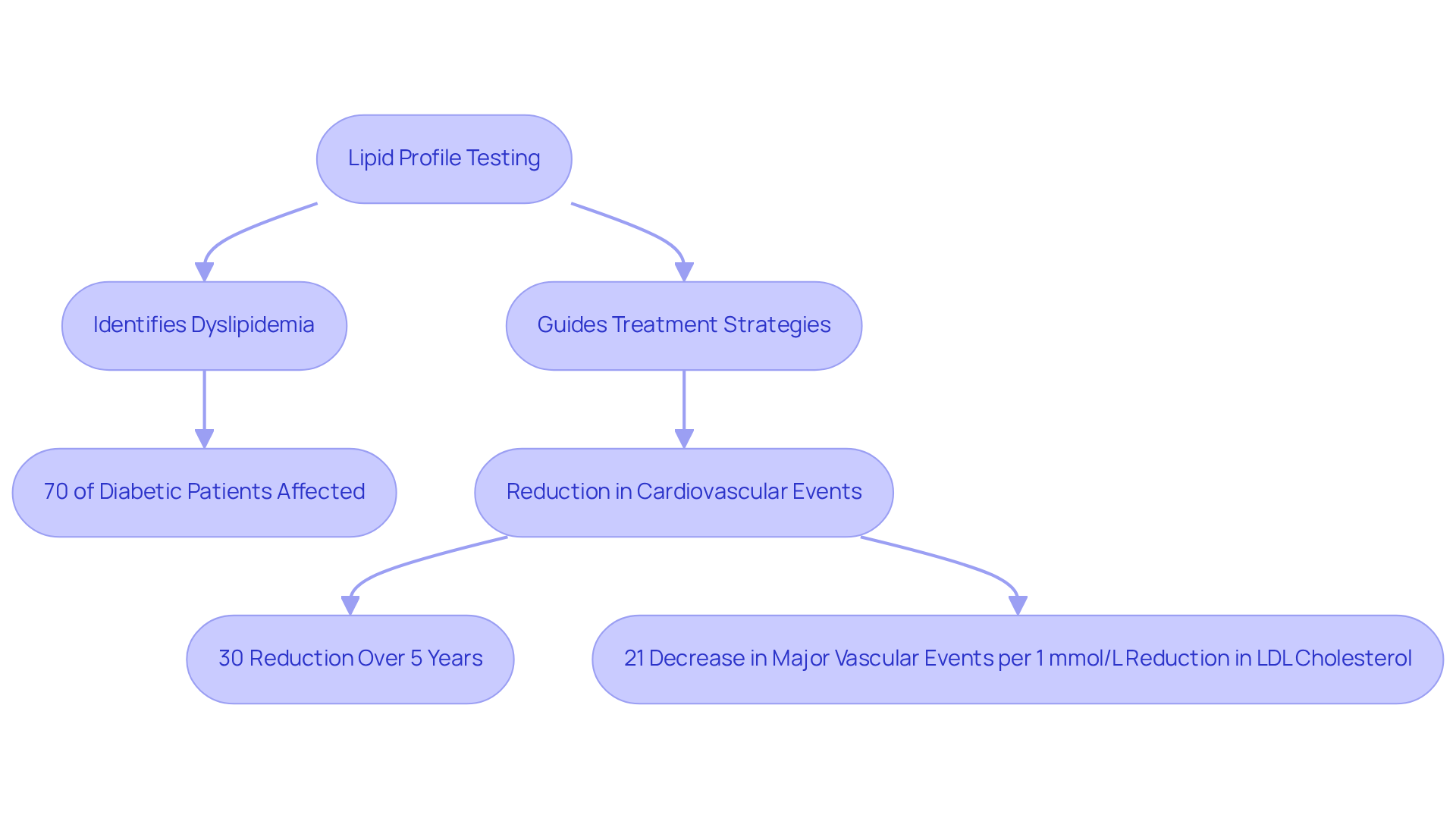
Urinary Albumin Test: Early Detection of Kidney Damage
The Urinary Albumin Test is a vital tool for assessing kidney health, especially for those managing high blood sugar as part of type 2 diabetes lab tests. By measuring the amount of albumin in your urine, this test can uncover early signs of kidney damage, particularly diabetic nephropathy. When albumin levels are elevated, it often signals that your kidneys are under stress. This makes regular screening essential for timely intervention and care.
It's understandable to feel concerned about your kidney health. Research from the Kidney Research Institute and Division of Nephrology at the University of Washington highlights the increasing prevalence of diabetic kidney disease in the United States, which can be monitored through type 2 diabetes lab tests. This underscores the importance of the Urinary Albumin Test. By identifying issues early, you can significantly reduce the risk of serious kidney complications, which can arise when managing blood sugar levels.
To prioritize your kidney health, newly diagnosed patients are encouraged to schedule this test annually. Discussing the results with your healthcare provider is crucial for proactive management of your condition. Remember, you're not alone in this journey. For further information on managing your health and understanding your test results, T2DSolutions offers valuable resources and support to help you navigate this experience with confidence.
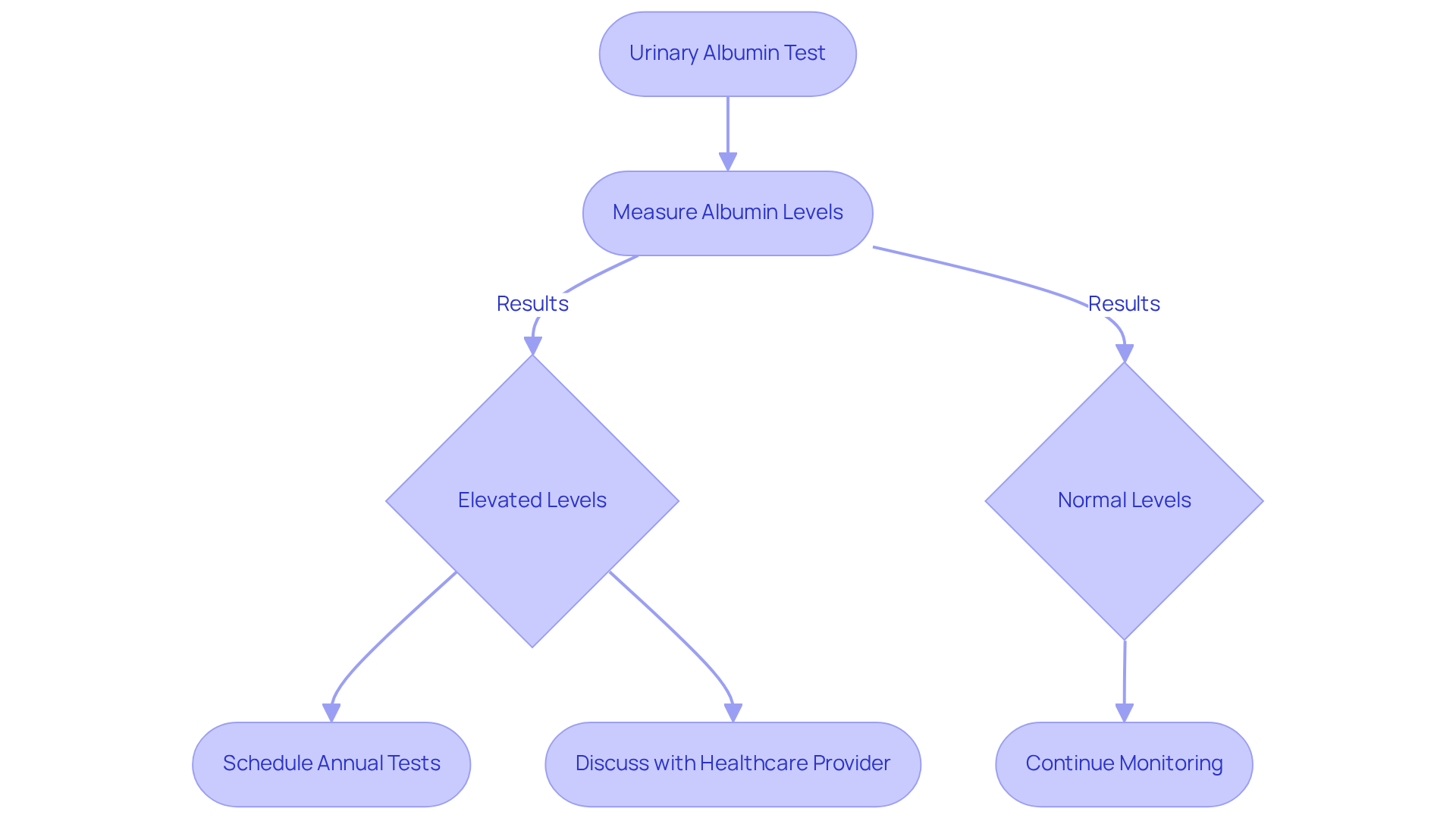
Thyroid Function Tests: Managing Complications in Diabetes
Thyroid function tests play a vital role in assessing thyroid hormone levels in the blood, which significantly influence glucose metabolism and insulin responsiveness. If you’re facing blood sugar challenges, it’s important to know that you may be at a higher risk for thyroid disorders. Regular screening can be a crucial step in your health journey. Research indicates that approximately 30% of individuals with blood sugar issues may experience irregular thyroid function. This can complicate management and lead to unpredictable fluctuations in blood sugar levels.
For instance, if someone has undiagnosed hypothyroidism, they might find it difficult to manage their weight and experience increased insulin resistance. This can make blood sugar management even more challenging. Therefore, keeping an eye on your thyroid health is essential. It can enhance your ability to manage blood sugar and prevent potential complications, ensuring that you maintain stable blood sugar levels and overall well-being.
Remember, you’re not alone in this journey. Monitoring your thyroid health can be a supportive step towards achieving your wellness goals. If you have concerns, reaching out to a healthcare professional can provide you with the guidance and resources you need.
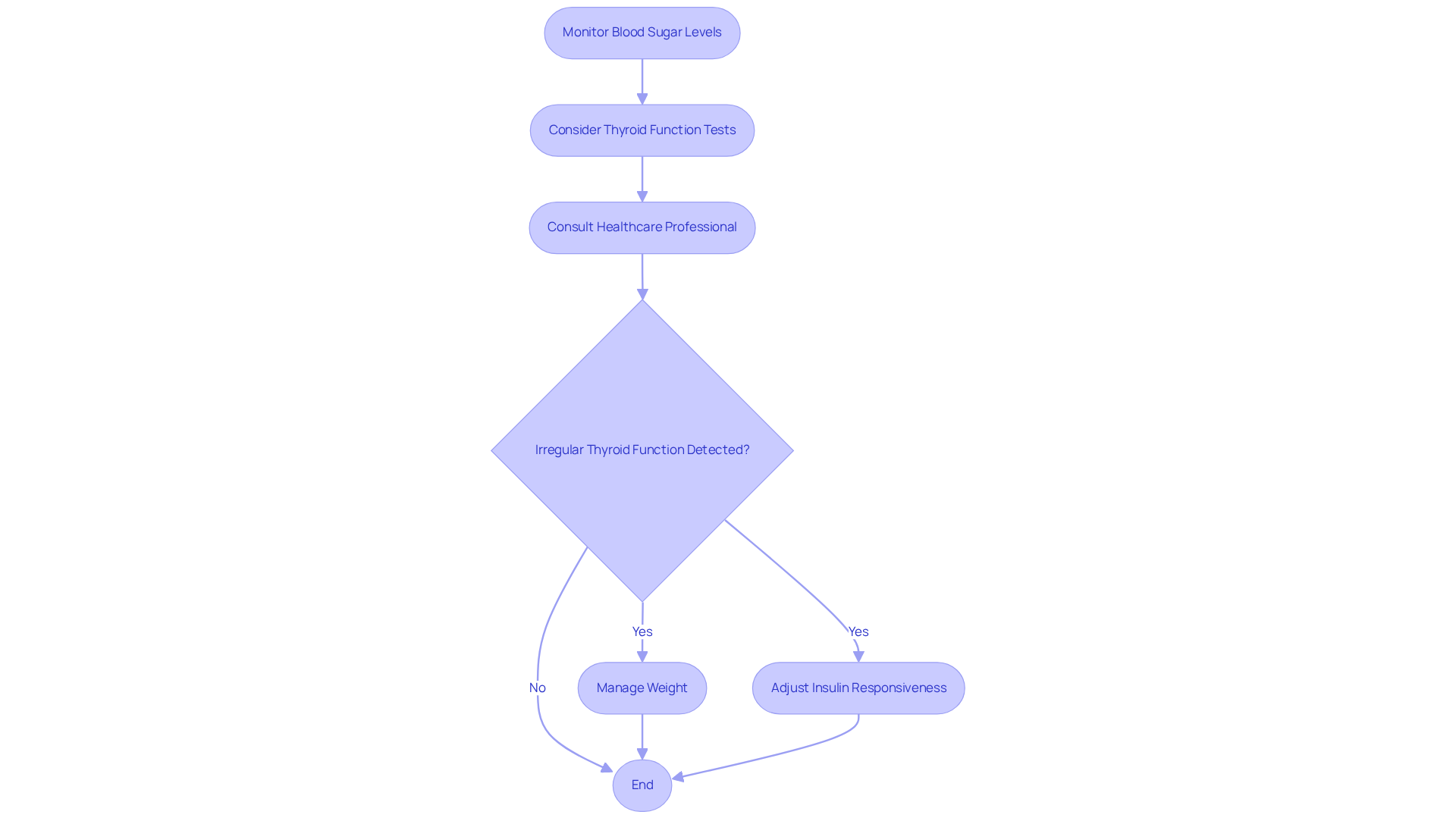
Vitamin D Levels: Impact on Insulin Sensitivity and Health
Vitamin D concentrations play a vital role in insulin sensitivity and overall well-being. Recent research indicates that insufficient vitamin D levels are linked to a higher risk of developing conditions that may require type 2 diabetes lab tests. It's concerning to note that the International Diabetes Federation reported about 10.5% of adults aged 20-79 were affected by this condition in 2021, with projections suggesting this could rise to 12.2% by 2045. This highlights the urgent need to address vitamin D deficiency in this context.
For those managing their blood sugar, consistently tracking vitamin D levels is essential, as it can significantly impact health outcomes. Case studies have shown that vitamin D supplementation can lead to remarkable improvements in insulin sensitivity and glycemic control. For instance, a meta-analysis revealed that vitamin D supplementation resulted in a statistically significant reduction in fasting plasma glucose (FPG) by 5.02 mg/dl and a decrease in HbA1c values by 0.20% among patients undergoing type 2 diabetes lab tests.
Nutritionists emphasize the importance of vitamin D in regulating blood sugar, noting that adequate amounts can enhance insulin secretion and improve metabolic health. Real-life experiences demonstrate that individuals with low vitamin D levels who engaged in supplementation saw better management of their condition. This underscores the necessity for healthcare providers to consider vitamin D status as part of a comprehensive care strategy. Understanding the intricate relationship between vitamin D and diabetes is crucial for optimizing treatment and improving patient outcomes.
You're not alone in this journey. We are here to support you every step of the way as you navigate these important health considerations.
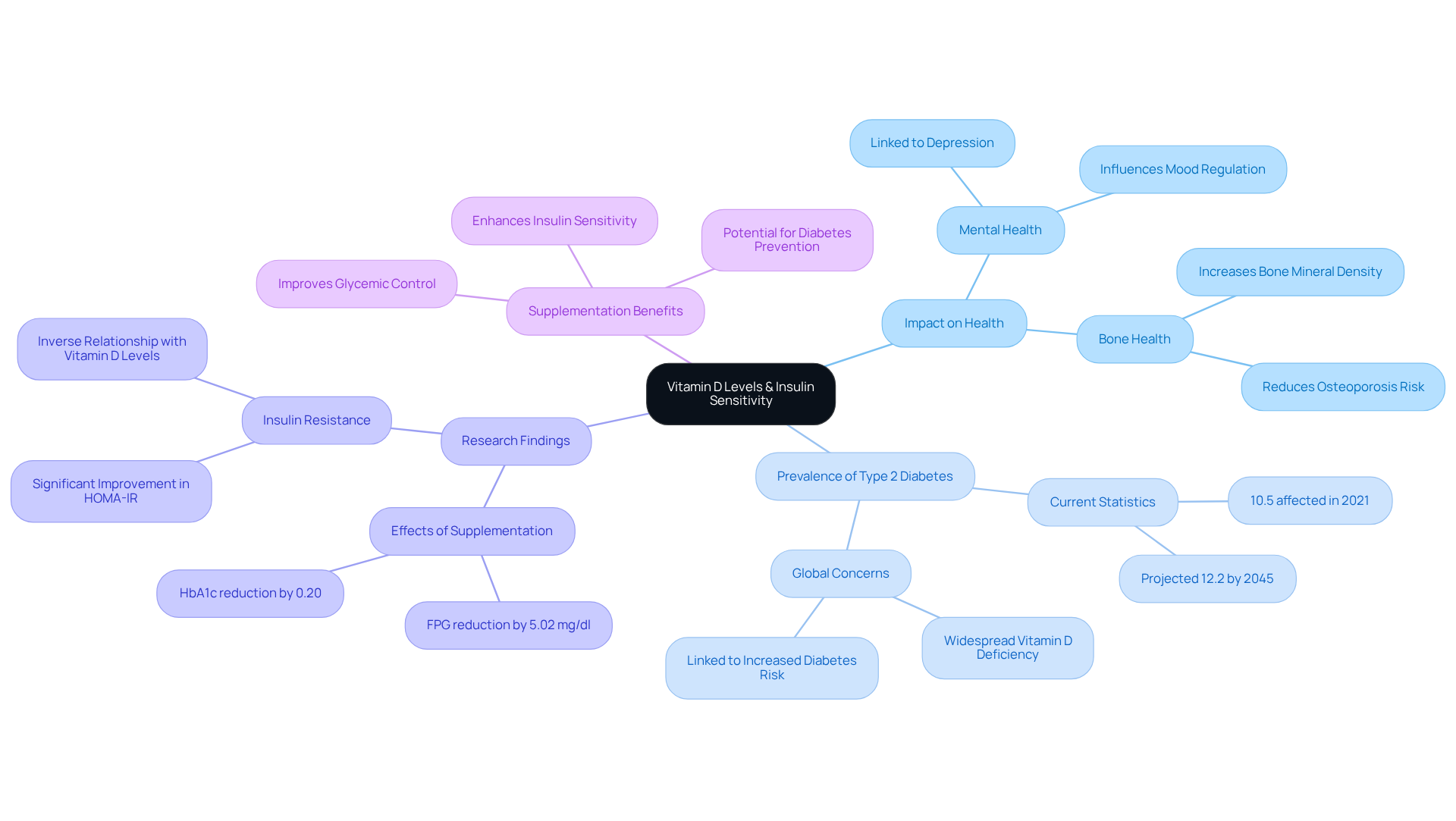
Conclusion
Understanding the essential lab tests for managing Type 2 Diabetes is crucial for empowering you to take charge of your health. These tests provide critical insights into blood sugar levels and play a significant role in identifying potential complications. They guide effective treatment strategies, helping you navigate your diabetes journey and work collaboratively with healthcare providers to achieve optimal health outcomes.
Key insights include the importance of tests like the Fasting Plasma Glucose, Hemoglobin A1C, and Oral Glucose Tolerance Test, which are essential for diagnosing and monitoring diabetes. Additionally, tests assessing insulin production, cardiovascular risk, kidney health, thyroid function, and vitamin D levels provide a comprehensive view of your health status. Regular monitoring through these tests allows for timely interventions and personalized care, ultimately leading to improved management of your condition.
As the prevalence of Type 2 Diabetes continues to rise, the significance of these lab tests cannot be overstated. You're encouraged to utilize the resources available at T2DSolutions and engage actively in your health management. By prioritizing regular testing and seeking support, you can make informed decisions that enhance your quality of life and promote better health outcomes in the face of this growing public health challenge. Remember, you are not alone; support and resources are available to help you every step of the way.
Frequently Asked Questions
What is T2DSolutions and its purpose?
T2DSolutions is a platform dedicated to empowering individuals and healthcare providers with knowledge and resources for effective Type 2 Diabetes management, offering educational materials on blood sugar management, dietary plans, exercise routines, and the latest medical research.
How does self-management education impact Type 2 Diabetes patients?
Self-management education interventions have been shown to significantly improve patient outcomes, including reductions in HbA1c levels, with studies indicating a decrease of 0.64% in randomized controlled trials and 1.27% in quasi-experimental studies.
What role does community support play in managing Type 2 Diabetes?
Community support enhances self-care behaviors and improves mental health-related quality of life for individuals managing diabetes, fostering connections among those facing similar challenges.
Why is the Fasting Plasma Glucose (FPG) test important?
The FPG test assesses blood sugar levels after fasting for at least 8 hours, helping to identify glucose intolerance and prediabetes, which is crucial for managing blood sugar levels and making informed lifestyle choices.
What are the FPG level ranges for diagnosing glucose intolerance and prediabetes?
A fasting blood glucose level of 126 mg/dL or higher indicates glucose intolerance, while levels between 100 and 125 mg/dL suggest prediabetes.
How many adults in the U.S. are affected by prediabetes, and why is regular testing important?
Approximately 88 million adults in the U.S. are living with prediabetes, often without symptoms, highlighting the need for regular testing, especially for those at risk.
What is the significance of the Hemoglobin A1C test in diabetes management?
The Hemoglobin A1C test evaluates average blood sugar levels over the past 2 to 3 months, helping to assess long-term glucose management and determine diabetes or prediabetes status.
What A1C levels indicate diabetes and prediabetes?
An A1C level of 6.5% or above suggests diabetes, while levels between 5.7% and 6.4% indicate prediabetes.
How can individuals use their A1C results for diabetes management?
Regular assessments of A1C levels allow individuals and healthcare professionals to evaluate blood sugar control strategies and make necessary adjustments for effective management.
What support does T2DSolutions offer to individuals managing Type 2 Diabetes?
T2DSolutions provides resources and guidance to help individuals understand their test results, manage their conditions, and create personalized management plans in collaboration with their healthcare providers.



